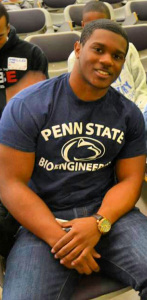“Competitive” Doesn’t Mean Don’t Try: The career fair for first-year students
by Cayla Castells
From the moment you enter college, rather from the moment you enter “adulthood,” everyone is asking what you want to do with your life. While many students in their late teens struggle with the thought of planning their futures, I was fortunate enough to have a plan. From previous experiences, I knew that I wanted to work for General Electric. I had a plan, but then I was faced with the means of carrying out that plan. I talked about working for GE to several of my friends, all of which had the same answer: “Go out there and do your best but try not to get your hopes up.” Every person hinted at the idea of competition and how in the real world, there was not a spot for everyone. I took this as a challenge and despite the negative response I received from my peers, I decided to try anyway. For all those experienced with job hunting in college, the obvious next step was the career fair.
Before heading to the Engineering Career Fair, I did a lot of homework. I looked on the website to see which companies would be attending. I asked Cheryl Knobloch, Women in Engineering Program (WEP) director, numerous questions and even reached out to some alumni about their experiences. My Women in Engineering Program Orientation mentors were able to give me helpful advice regarding everything from handshakes and appropriate attire to questions to ask the recruiters. Each piece of advice was vital in the success of my trip to the career fair.
Following my plan, I only approached the GE Transportation booth and spoke with the recruiter for several minutes. I highlighted aspects of my resume I wanted her to notice and asked her questions about the positions GE offered for freshman candidates. The conversation went smoothly and quickly led into a discussion about interviews the following day. I left the career fair knowing that I had used all the advice given to me and succeeded.
My trip resulted in an interview and an offer for a position, but not everyone can have the same experience. The important thing to note is that the experience at the career fair itself is more than enough. Starting to network as soon as possible is the key to becoming an expert at career fairs and ultimately getting a job. The more times someone attends, the more successful they will be. Most companies do not accept freshman applicants but that did not stop me from attending and it should not stop anyone else. Even if the odds are stacked against you, doing your homework and showing a genuine interest and knowledge about a company shows a lot. This extra piece of effort ultimately stood out to my recruiter, rewarding me with an interview and a position.
Cayla Castells is a first-year engineering student majoring in mechanical engineering. A native of Downingtown, PA, she is a member of the engineering sorority Phi Sigma Rho, the secretary of the acapella group Sorenity Row, and is active within WEP. Cayla hopes to take her technical skills to sales and work as either a sales engineer or in management.
Read More






Follow Us!